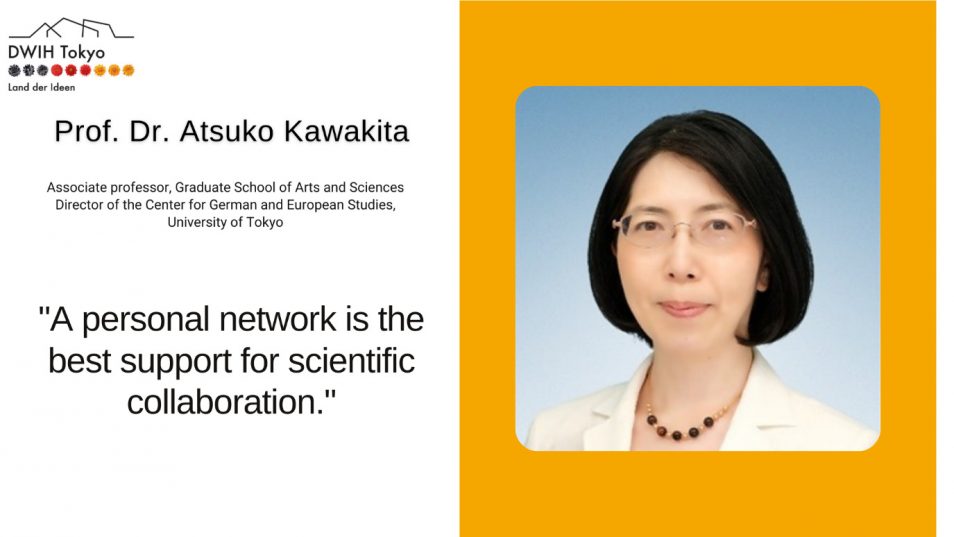Prof. Dr. Atsuko Kawakita
 © DWIH Tokyo / Prof. Dr. Atsuko Kawakita
© DWIH Tokyo / Prof. Dr. Atsuko Kawakita
In our series “Connecting East and West – A Short Interview with …” we introduce you to people involved in German-Japanese research collaborations – and their insights on how and where to cooperate successfully!
This week we welcome Assoc. Prof. Dr. Atsuko Kawakita, Director of the Center for German and European Studies at the University of Tokyo. An expert on contemporary German history, she shares her experiences in international research exchanges, emphasizing in particular the importance of long-term and enduring collaborations.
Prof. Dr. Kawakita accompanied the 2021 Bundestag election campaign in Germany as a DAAD election observer. A report on her trip can be found here.
1. What kind of research makes you excited, and why?
My own research focuses on contemporary German history after the Second World War. I am particularly interested in the question of how Germany dealt with the consequences of the war and Nazism in the context of “overcoming the past”. Japan and Germany are united by facing the challenge of having to build a new system after their defeat in World War II. By looking at the example of Europe, where progress was made under different national and international conditions, we can also learn more about the problems in East Asia. I want to do research that will not only help me understand Germany, but also make my own country and the world more interesting.
2. What is your connection to Germany?
My first encounter with the German language was in the second year of high school, when I chose it as a second foreign language. At university, I continued my studies of the German language and chose German Studies as my major in graduate school. Since then, I have been studying contemporary German history. I lived in Germany twice for a longer period of time. Once in 2000 during a Japan Society for the Promotion of Science (JSPS) research fellowship, when I went to Germany to do research for my PhD thesis under Professor Axel Schildt at the Research Center for Contemporary History in Hamburg. I spent my second stay in 2017-18 as a visiting scholar at the Faculty of Philosophy I at Martin Luther University Halle-Wittenberg. Currently, I am working as the director of the Center for German and European Studies at the University of Tokyo, which was established with the support of the German Academic Exchange Service, to promote education, research, and outreach about and on Germany and Europe.
3. Where should Japan and Germany cooperate more?
While the question of which areas to collaborate in is important, I personally believe that there is potential for collaboration in all areas, and that it is more a matter of the type of research cooperation that can be established in each area. In my research field of humanities and social sciences I would like to see an expansion of long-term collaborations.
Today, it is common for individual young researchers to study in Germany during their master’s or doctoral studies. The cooperation between the University of Tokyo and the Martin Luther University Halle-Wittenberg within the framework of the Japanese-German Joint Graduate Program “Transformations of Civil Society” (2007-2017) is particularly worth mentioning in this context. In this project, the JSPS and the German Research Foundation (DFG) jointly supported the training of doctoral students and research at the respective partner universities in Germany and Japan. The close cooperation in teaching and research that grew during the ten-year project has been instrumental in establishing a stable and sustainable system of cooperation between the two universities that will continue after the end of the project, and in extending the cooperation to other universities.
Although Covid-19 has led to increased restrictions on travel abroad, the pre-existing collaborative framework with German partner universities has allowed a smooth transition to joint seminars, colloquia and research supervision to be conducted online. Joint research projects are also progressing well. In order for the collaboration to continue under difficult conditions, a stable and trusting relationship must be established over a long period of time. In this sense, I believe that it would be good if a long-term cooperation could be created in various areas.
4. What is your winning formula for research cooperation?
Collaboration in research takes many forms. There is probably no single “secret.” From my own experience, I can say that short-term, individual collaborations have their advantages, of course, but I have found that long-term, stable cooperation produce higher quality research results and open up new opportunities for working together. It is not an easy task to maintain such long-term, enduring collaborations and to foster mutual interest and trust, but I believe that it is worthwhile, as valuable research partnerships emerge from such efforts.
5. What advice to you have for German / Japanese researchers looking for joint projects?
A personal network is the best support for scientific collaboration. It is especially important for young researchers to expand their contacts through study and long-term stays abroad. Today, frameworks exist in Japan and Germany to support international collaborative projects, both individual and between institutions. The existing opportunities only need to be used well.
Prof. Dr. Atsuko Kawakita
- PhD in Area Studies, Graduate School of Arts and Sciences, University of Tokyo
- Associate professor at the Graduate School of Arts and Sciences and director of the Center for German and European Studies, University of Tokyo
- Fields of research: German contemporary history and German studies
- Major publications include works regarding National Socialism, the Holocaust, German post-war history, commemorative culture, refugees, expulsion and migration.
Contact information:
kawakita@g.ecc.u-tokyo.ac.jpTo read other articles related to the DWIH Tokyo Interview, click here.
